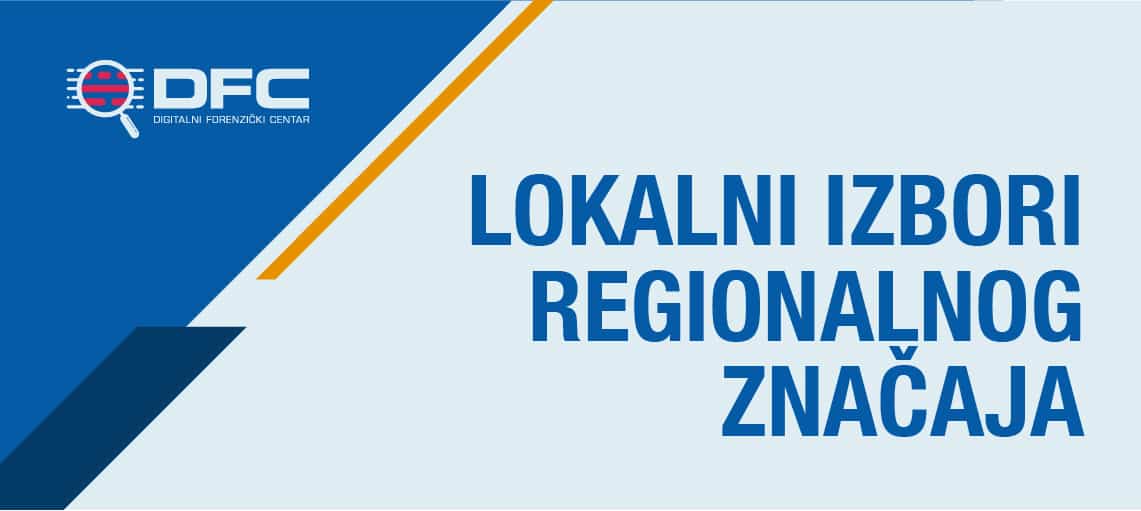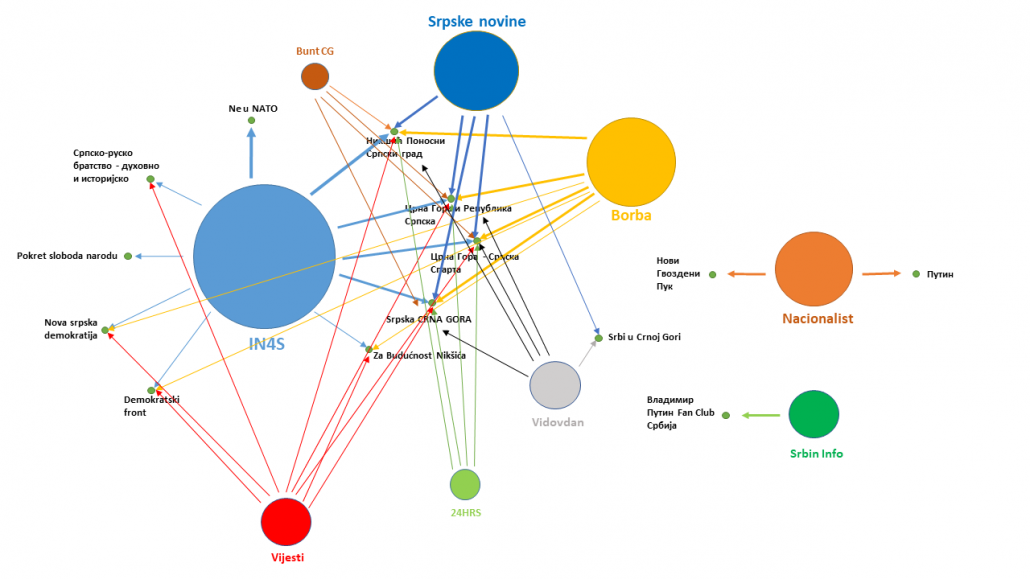Local parliament elections in Niksic scheduled for March 2021, have undoubtedly drawn a great deal of attention not only in Montenegro but in the region as well. Therefore, the DFC carried out the analysis of the election atmosphere in Niksic that covers the political situation ahead of the elections, an overview of the media coverage of this topic, and the activities on the social media platform Facebook.
The analysis indicates and proves why the political situation in Montenegro is quite complex. The election campaign, pretty intensive from the very beginning, is followed by a tough political fight, tensions, incidents, as well as disinformation, and narratives. The Serbian Orthodox Church has been an active participant in the local elections in Niksic, as it was in the parliamentary elections. This religious organization’s priests called on the citizens to change the government in Niksic, to confirm the freedom obtained through blood and lives. It is also evident that the political parties have been fighting among themselves to win the SPC’s support.
During the last parliamentary elections, foreign meddling in the electoral processes in Montenegro, the spread of disinformation and propaganda was mainly coming from Serbia. The same scenario is seen in local elections in Niksic. Moreover, the influence coming from Serbia is more intense compared to the August parliamentary elections. Besides obvious propaganda and disinformation coming from the Serbia-based media, this country’s political activists have been also visible.
The DFC monitoring of the Serbia-based and Montenegro-based media coverage of the elections in Niksic in the period from February 1 to 28, 2021, shows that the upcoming elections in this town surpass the significance that the local elections usually have. For the purposes of this research, five news portals from both Montenegro (Borba, CdM, IN4S, Pobjeda, and Vijesti) and Serbia (Alo, Nacionalist, Novosti, Republika, and Srbin.info) were taken in this analysis.
The pro-Montenegrin media camp spreads the narrative that Serbia is meddling in Niksic elections by providing financial and logistic help, as well as by sending its people to help the pro-Serbian opposition parties in that town. In the texts from those media, the President of Serbia Aleksandar Vucic and his Serbian Progressive Party are frequently accused of implementing such activities. Additionally, it is concluded that if the DPS or another pro-Montenegrin party does not win the elections in Niksic, the project of the Serb’s world creation will start.
Elections in Niksic are one of the main topics in the Serbia-based media. Certain media outlets introduced special shows/columns dedicated to the upcoming elections. Since the beginning of February, TV Happy has been broadcasting the serial Battle for Niksic. The news portal and daily Novosti – that according to the research of the Council for Strategic Policy from Belgrade had the highest number of fake news published on its covers in 2020 – launched a column Elections in MNE. The column of the same name was also launched by the tabloid Alo. The content that these editorial offices launch is frequently insulting, full of disinformation and narratives. The Democratic Party of Socialists and President Milo Djukanovic are most often targeted by these news portals, which claim that they are facing a definite defeat in Niksic. The Serbia-based media strongly support the coalition For the Future of Niksic (Za budućnost Nikšića), gathered around the Democratic Front. The press releases of this coalition are being integrally published, with the unavoidable emphasis on their indisputable electoral victory. Besides the DPS and Djukanovic, a frequent target of the Serbia-based media is the leader of the People’s Movement Miodrag Daka Davidovic, as well as Prime Minister Zdravko Krivokapic.
The monitoring of Facebook, as the most present social media in Montenegro, revealed the coordinated activity ahead of the local elections in Niksic. We detected 292 coordinated activities (time, narrative, and content coordination) from 15 Facebook pages with 305, 000 likes in total. During the monitored period, from February 1 to 28, 2021, these activities resulted in 1, 060 posts. The discovered network of Facebook pages frequently shared content of certain media, political parties, and political activists close to them in a coordinated manner. The most active Facebook pages were Никшић Пoнoсни Српски град, Црна Гора и Република Српска, Црна Гора – Српска Спарта, and Srpska CRNA GORA. These Facebook pages mostly promoted and synchronously shared content from the media outlets IN4S, Borba, Nacionalist, and Srpske novine. The admins of the monitored Facebook pages are coming from whether Montenegro, Serbia, or Germany. The content posted on the analyzed Facebook pages showed their clear bias toward the opposition political parties in Niksic, calling on the citizens to vote for them. That way, the illusion of stronger support than in reality is created, which additionally influences the choice of the electors.
The Digital Forensic Center has been trying for some time to build the understanding of the citizens by raising awareness to the current internet phenomena and pointing out to increasingly present problems of hate speech, finger-pointing without any proof, the spread of disinformation, and other negative implications of the modern digital era. In order to fulfill this goal, this analysis was created with the following recommendations:
- Prompt and decisive combat against malign foreign influence in the election processes in Montenegro;
- Better coordination of the state authorities in the suppression of malign foreign influence in the election processes in Montenegro;
- Establishing cooperation on all social levels in the fight against disinformation campaigns online, especially ahead of the significant social and political events
- Establishing cooperation on all social levels in order to create and implement campaigns to raise public awareness of the misuse and coordinated activities on the internet and the social media platforms;
- Establishing cooperation on all social levels in order to organize specialized workshops for journalists, with a goal to strengthening their capacities in the fight against negative digital phenomena;
- Better cooperation of civil sector and state authorities, which would additionally provide the regularity of the election processes;
- Greater role of the civil sector and state authorities in developing a democratic and political culture in order to reduce social and political intolerance that may cause incidents;
- Responsibility of the highest state authorities in order to prevent the election corruption;
- Establishing cooperation on all social levels to organize workshops and courses of training for the citizens in order to raise awareness and enhance resilience to fake news and disinformation;
- Transparent work of the state authorities in regulating the election processes.
Click here to download the PDF version of the research.


